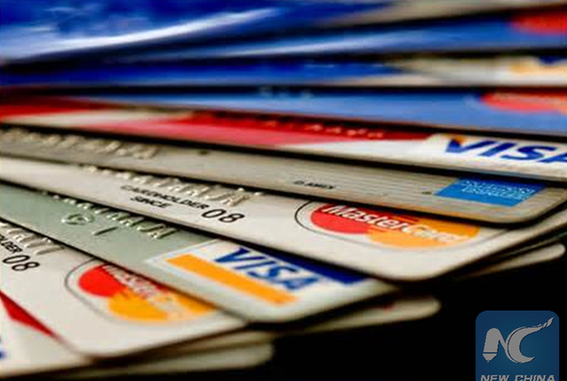As bad loans rise, so do private debt-collection companies
 0 Comment(s)
0 Comment(s) Print
Print E-mail China Daily, February 29, 2016
E-mail China Daily, February 29, 2016
|
|
|
Banks cards. [Xinhua] |
The voice of Li Wen, 28, a debt collector in Shanghai, became hoarse earlier this month, due to hundreds of high-decibel phone calls in the past two months to credit cardholders who defaulted on their repayments.
Li's employer, Shanghai China Promise Ltd, foresees high demand for firms like itself as various types of lenders, including banks, are expected to outsource debt collection due to rising bad loans.
For China's banks, peer-to-peer lending platforms and microfinance companies, the problem of non-performing loans or NPL intensified in the past five years.
That brought about a need to hire specialist debt-collection agencies, particularly in regions where credit expanded and economic growth slowed, said analysts.
For, employing a full-time team of hundreds of debt-collectors could prove a huge cost for lenders.
Chai Jun, a manager with Shanghai Heng Xin Asset Management Company, said it may cost more than 3 million yuan annually for a branch of a commercial bank in Shanghai to hire a full-time debt-collection team dedicated to errant credit card-holders alone. However, outsourcing the whole task could cut the cost by more than half.
The need for external debt-collection agencies is particularly felt before the end of June and December every year, the "seasonal peak" for lenders that scramble to meet regulators' half-yearly asset quality requirements.
No wonder, Shanghai China Promise's staff strength rose from 120 to 500 in the last two years. It plans to hire more in the next few years.
A report by China Orient Asset Management Corporation, which manages bad loans, said NPL may continue to grow in China into 2017.
By the fourth quarter of 2015, the NPL ratio of China's commercial banks reached 1.67 percent, up 8 basis points quarter-on-quarter.
The uptrend started in the second quarter of 2013, according to data of the China Banking Regulatory Commission.
By the end of 2014, China's commercial banks were staring at more than 35.76 billion yuan in bad loans of credit card-holders alone, up 42 percent year-on-year, according to the China Banking Association's latest annual report on credit card development in China. The report was released in July 2015.
While China Promise's debt collector Li continues to make phone calls despite her hoarse voice, some of her colleagues may visit errant debtors for a face-to-face confrontation and to urge them to repay within a given time (usually seven days).
If they still don't repay, debt-collection agencies, working in tandem with law firms, will use legal remedies like dispatching lawyer notices, or even filing lawsuits.
"Everything must be legal and transparent, and every phone call, visit and written materials are recorded. Otherwise, we'll be no different from hooligans," said Li, laughing.
She sees her job as an essential role that helps build a society with better credit.
Agrees Xiao Bo, founder of Zero and One Internet Technologies Co Ltd, a Beijing-based enabler of trading in non-performing assets. Banks, he said, typically contract out some well-specified, totally legal debt-collection functions to external agencies.
Such tasks may include making phone calls and visiting a debtor's home. If debt-collection agencies exceed their remit or violate the law, banks cannot be held responsible, although their reputation may get besmirched.
"Debt-collectors generally don't adopt violent means. An odd extreme case could involve getting physical with truant debtors, but that's about it. For debt-collection agencies, profits are not so high as to compel them into adopting illegal methods," Xiao said.
But unlike banks, other lenders like peer-to-peer lending platforms, small loan companies and guarantee companies engaged in private lending are said to be not averse to dropping the kid-glove treatment and instead using threats to make errant debtors repay.
Stressed out, many debtors would heed that message and payup, if they could, Xiao said. Ye Mingbo, 24, a shop assistant, said he received phone calls from debt-collection agencies in May 2015, when he could not repay some 8,000 yuan.
Ye had used his credit card to buy a laptop and camera lenses on installment basis. He could not repay in time as he was jobless for three months after he made the purchases.
After six months, Ye started receiving text messages from the bank, urging him to repay. Phone calls followed from the bank's in-house credit card services department. Then phone calls from a debt-collection agency started. On the fourth day, the agency called Ye, taught him how to analyze his financial situation and repay.
Despite outsourcing debt-collection to external agencies, banks have their own teams to deal with bad loans and seek help from lawyers, courts and the police.







Go to Forum >>0 Comment(s)